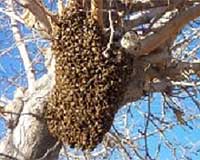 |
London (AFP) Sept 20, 2009 In tiny urban gardens, Britons are doing their bit to counter the mysterious worldwide decline of bees -- they are starting to keep their own. The ancient art of beekeeping is enjoying a renaissance in Britain, fuelled by concerns about the provenance of food and the desire to do something for the environment. Jon Harris, 43, was a bee novice just six months ago. Now, with hundreds of bees buzzing around him in his white protective suit, he lifts the frames out of the hive in his compact back garden in Brixton, south London, and gives a satisfied smile at what he finds. "That honeycomb is just amazing," he says, brushing off the remaining bees to reveal the white-crusted product of the busy insects' magic. Harris has enjoyed a bumper first summer with his hive, harvesting 20 kilogrammes (45 pounds) of honey -- "which goes to prove there is something around here they love." Bees don't need pastures of wild flowers to find nectar -- the hedgerows and bushes alongside the railway line behind his house are a perfect substitute, but they will happily fly up to four miles (6.5 kilometres) looking for food. When Harris was made redundant from his job as a retail buying manager in March, he found he had time on his hands. He had always wanted to keep bees -- but he thought his garden was too small for a hive. A one-day course on urban beekeeping set him on the right path. "As long as you have enough room for a hive, you've got enough room to keep bees," he told AFP. "It is one of those hobbies that gets you outdoors and it actually gets you involved with something natural as opposed to doing a pottery course or a photography course." While the bees are thriving in one London garden, globally they are in trouble. Experts gathered this weekend in the southern French city of Montpellier for the 41st world apiculture conference, Apimondia, to ponder why parts of North America and Europe, and now also Asia, have been struck by Colony Collapse Disorder, which can wipe out up to 90 percent of a bee community. Chris Deaves, chair of education at the British Beekeepers' Association, said a combination of factors was probably to blame. "The decline is real," he says. "In the UK last winter we lost about 21 percent (of the population). "The winter before it was about 25 to 30 percent. It is probable that the cause is multi-layered." Some experts say the blood-sucking varroa mite could be to blame, but pesticides, viruses and industrialised farming are also suspected to be attacking and weakening bee communities. "It is rather like a human being, when you are rundown you may start to exhibit the effects of the flu," Deaves says. But his smile returns when he reflects on the newfound public enthusiasm for his passion in Britain. "The interest in beekeeping is growing very, very rapidly," he said. "Perhaps it is because of the feeling that everybody has to do something to make the planet a better place to live," especially in polluted cities. "You can't keep cows or sheep (in a city), but you can keep bees," Deaves said. "People are also concerned about having the capability to create food in the UK," and people are increasingly worried about where their food comes from, and how many air miles were involved in getting it to the dinner table, he said. Back in Brixton, Jon Harris' honey has travelled just a few steps from the garden to his kitchen. He slices the honeycomb, takes a taste and licks his lips. "It has got a very minty, eucalyptus-y taste to it when it comes out. That dies back a bit. But it is probably the best honey I have tasted." Share This Article With Planet Earth
Related Links Farming Today - Suppliers and Technology
 Bee deaths set apiculture congress abuzz
Bee deaths set apiculture congress abuzzMontpellier, France (AFP) Sept 17, 2009 Pesticides, viruses, industrialised farming, fungus... what on Earth is killing our bees? That's the big question being asked at Apimondia, the 41st world apiculture congress, where 10,000 beekeepers, entomologists and other actors in the honey business are gathered in this southern French city until Sunday. Across parts of North America and swathes of Europe, but also now in patches of ... read more |
|
| The content herein, unless otherwise known to be public domain, are Copyright 1995-2009 - SpaceDaily. AFP and UPI Wire Stories are copyright Agence France-Presse and United Press International. ESA Portal Reports are copyright European Space Agency. All NASA sourced material is public domain. Additional copyrights may apply in whole or part to other bona fide parties. Advertising does not imply endorsement,agreement or approval of any opinions, statements or information provided by SpaceDaily on any Web page published or hosted by SpaceDaily. Privacy Statement |